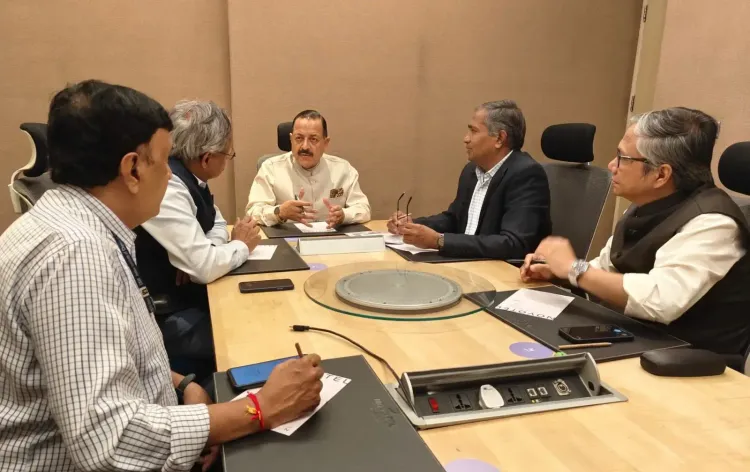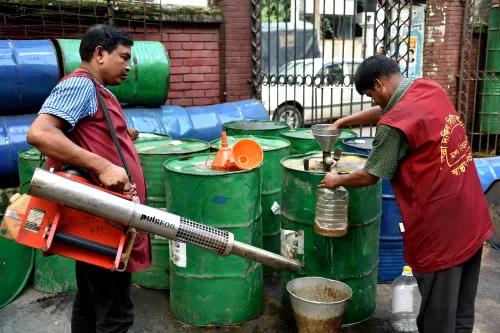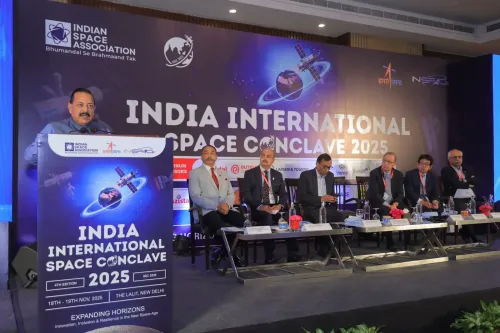Union Minister Commends the Impact of CSIR Labs in Hyderabad on Drug Discovery and Genetic Diagnostics

Synopsis
Key Takeaways
- CSIR-IICT advances in chemical and pharmaceutical sectors.
- CSIR-CCMB leads innovations in genetic diagnostics and biotechnology.
- COVID-19 response included indigenous diagnostic kits and mRNA vaccine tech.
- CSIR-NGRI developed India's first strain map for earthquake vulnerability.
- Hyderabad recognized as a hub for scientific research and entrepreneurship.
Hyderabad, April 6 (NationPress) Union Minister of State for Science & Technology Jitendra Singh has praised the significant contributions of CSIR institutes located in Hyderabad in the fields of drug discovery, genetic diagnostics, and the development of cost-effective Active Pharmaceutical Ingredients.
The Minister convened a meeting to evaluate the recent achievements of Hyderabad's CSIR laboratories, particularly following the personal support and encouragement provided by Prime Minister Narendra Modi over the past decade.
Directors from three leading CSIR laboratories in Hyderabad—CSIR-Indian Institute of Chemical Technology (CSIR-IICT), CSIR-National Geophysical Research Institute (CSIR-NGRI), and CSIR-Centre for Cellular and Molecular Biology (CSIR-CCMB)—were present at the meeting, which served as a forum for the directors to showcase their institutes' recent achievements and strategic scientific contributions.
The Minister received updates from Dr. D. Srinivasa Reddy (Director, CSIR-IICT), Dr. Prakash Kumar (Director, CSIR-NGRI), and Dr. Vinay Nandicoori (Director, CSIR-CCMB).
Dr. Srinivasa Reddy informed the Minister about IICT’s groundbreaking contributions to enhancing India’s chemical and pharmaceutical industries.
Additionally, the institute has developed safer and more effective agrochemicals, and its advancements in catalysis have resulted in innovative catalysts for hydrogenation, oxidation, and polymerization processes that are commonly used in industrial applications.
He highlighted key accomplishments of CSIR-IICT, including the creation of compostable plastics in collaboration with GreenWorksBio. Furthermore, he mentioned the development of Hydrazine Hydrate in partnership with Gujarat Alkalies and Chemicals Limited (GACL). In the area of sustainable technologies, the institute’s Anaerobic Gas Lift Reactor (AGR) technology facilitates the efficient conversion of biodegradable waste into biogas and bio-manure.
Dr. Vinay Nandicoori, Director of CSIR-CCMB, elaborated on the institute’s achievements in molecular biology, genetic diagnostics, and biotechnological innovation. He noted that CCMB was the first Indian institution to develop DNA fingerprinting technology, which has significantly influenced forensic investigations and legal proceedings in the country.
During the COVID-19 pandemic, the institute acted quickly by creating indigenous diagnostic kits, surveillance systems, and advancing mRNA vaccine technologies. One of CCMB’s most significant initiatives has been its work on sickle cell anemia, for which it developed a highly sensitive, low-cost diagnostic kit as part of the National Sickle Cell Elimination Mission.
The institute is also conducting research on illnesses like tuberculosis and encephalitis, and it has launched India’s first rare disease registry to better understand the genetic foundations of uncommon disorders. Through its Atal Incubation Centre (AIC-CCMB), the institute has supported over 160 startups focused on biotechnology innovations in healthcare, agriculture, and environmental sustainability.
The Minister was informed that in the field of conservation, CCMB continues to spearhead studies on the genetic diversity of endangered species such as tigers and olive ridley turtles, while also supporting wildlife forensics to combat illegal poaching and trade. Dr. Nandicoori emphasized the institute’s dual commitment to fundamental research and societal applications, linking deep scientific inquiry with tangible real-world impacts.
Dr. Prakash Kumar, Director of CSIR-NGRI, presented the institute’s notable achievements in earth sciences, particularly in seismic hazard mapping, resource exploration, and infrastructure support. He remarked that NGRI has created India’s first strain map to evaluate earthquake vulnerability in the Himalayan and Indo-Gangetic regions, a crucial step toward national disaster preparedness.
The institute is also engaged in deep seismic profiling under a national initiative aimed at deciphering the crustal structure of central India, which has implications for both tectonic research and mineral exploration. NGRI’s work on geothermal energy, particularly in Ladakh and Chhattisgarh, has opened new avenues for clean and renewable energy.
The Union Minister acknowledged the crucial role of CSIR laboratories in fostering scientific innovation, supporting national missions, and aiding India’s aspiration to become a self-reliant knowledge economy.
He stated that Hyderabad has emerged as a vibrant ecosystem for scientific research, innovation, and entrepreneurship.
In recognition of these three institutes' contributions during the meeting, it was resolved to organize a CSIR Startup Conclave in Hyderabad.
This event, scheduled for April 22–23, 2025, aims to enhance collaboration between research institutions and startups, promoting entrepreneurship in India.









